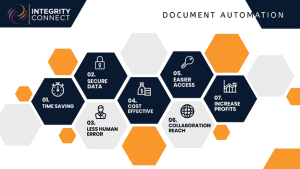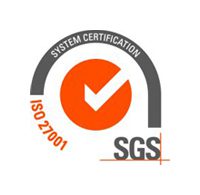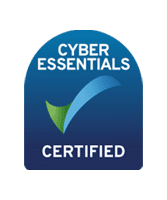What is document automation?
Document automation, sometimes referred to as document assembly, is the process of using systems or software to efficiently generate electronic documents at speed. It is essentially about automating the process of creating complex personalised documents on a large scale, without having to complete the time-consuming manual tasks that are traditionally involved in volume document creation.
Complex transactional documents often contain multiple pages that are composed from variable and optional paragraphs that are driven by information in the data. Connects automation software has the ability to build in the correct variables from multiple data sets based on a set of unique business rules. Working with our document automation team reduces the need for you to merge or re-input multiple data streams and simplifies the proofing process. We scope out a document automation project by building a base template and then identifying the different business rules and hierarchies from within the data sources to construct identifiable data sets and proofing outcomes. This allows us to provide you with structured proofs to show all business rule variants, speeding up the document sign off process.
Document automation is a valuable tool in sectors that are required to send out legally compliant or regulatory documents. These will contain high levels of personal and specific transactional data that then drive differing legal clauses or regulated content. Connect work with a number of clients in the Social Housing, Local Government and Financial Services sectors delivering document automation solutions. The work has enabled our clients to significantly reduce the time needed to manage their regular mailings such as rent reviews, building work notifications, council tax billing and insurance renewals.
How does document automation work?
Document automation works by creating an automated letter template, which will allow users to pull a variety of text and data from different sources, and then proceeds to insert them into these predefined areas. The templates encompass the whole document landscape from variable text and fixed graphics to more sophisticated elements such as dynamic images, graphs, and tables.
Document automation outputs can be tailored and defined to meet varying objectives dependent on the industry in which it is being deployed. Some examples of commonly automated documents by industry are detailed below:
- Social Housing – Rent Review Letters, Arrears Letters, Section 20 Notices
- Media – Content acquisition agreements, content licences, advertising sales agreements
- Local Government – Council tax notifications, electoral registers
- Pharmaceutical – Manufacturing agreements, marketing authorisation agreements, patent assignments, quality assurance agreements.
- Finance – Loan agreements, security documents, corporate authorities.
- Law Firms – Facility agreements, employment agreements, legal opinions
- Logistics – Account opening forms, supplier code of conducts, master service agreements.
You can automate nearly any type of document; however, we recommend focusing on ones that generate revenue for your business or save significant staff time by avoiding the constant repetition of manual processes. Any document suites that have a high degree of optionality, that require data inputs from different sources, need multiple stakeholder approvals, or require regular compliance updates should all be in scope for document automation.
What are the benefits of document automation?
Time Saving
One of the key benefits of a document automation project is the significant saving in staff time. The automation process is all about driving efficiency, eliminating manual inputs and streamlining the approvals process.
Secure Data
Using a document automation system means all the data is processed in a secure environment with a transparent audit and review process. Data transfer and proofing takes place within an secure environment utlising encrypted file transfers. This minimises both the risk of a data breach and ensures clients can control who access to sensitive and confidential information.
Increased Accuracy
By removing the manual aspects of document creation, the process reduces the risk of human error in re-keying data.
Cost Effective
Streamlining processes by using document automation systems will help to reduce overheads as well as staff operating costs. More efficient processing will also contribute to reducing your carbon footprint for document production.
Easier Access
By ensuring that documents are created and proofed in a secure environment it is straight forward to ensure controlled access. Final versions can then be held securely on our document archiving systems or uploaded directly to your own document management system.
Collaboration
Electronic document proofing and controlled user access allows effective collaborative working, with a clear and transparent audit trail and built-in approvals processes at every step of the way.
Return on Investment
A project to automate critical document streams can deliver a significant return on investment. This is achieved through the time reduction in creating documents, speed to market through increased efficiency and collaboration, and reduced queries thanks to improved design of the document landscape and improved relevancy and coherence of targeted messaging.
Final thoughts
Document automation is a complex process, but by working with experts in the field of Customer Communication Management you can leverage significant business benefits. Our role at Connect is to enable you to simplify the complex and ensure that your critical communications are processed, proofed, created and delivered in a timely manner across multiple channels. Whatever industry you work in, there can be demonstrable business benefits to engaging in the discovery process to see how document automation can help eliminate business process issues. If you would like to learn more the team at Connect would love to hear from you enquiries@integrity-connect.co.uk






